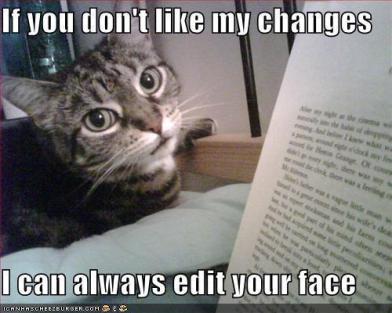Welcome to the New Year! I hope everyone had a very fun (and safe) holiday; I know I did. I’m particularly excited about 2012 because it’s the Year of the Dragon, and, being a Dragon, I’m supposed to have a lot of good luck! Here’s hoping….
And now we return you to your regularly scheduled writing rant. (Writer’s Rant. I like that!)
Today’s topic is editing and editors. Editors get a bad rap. I have a book of quotations for writers and all of the quotes that deal with editors are negative. As an editor myself, that makes me sad and a trifle defensive. Editors are portrayed as butchers who callously rip the heartfelt masterpiece of the artist to shreds without any regard for the heart and soul of the story or the feelings of its creator.
To an extent, they are right.
Editors are not here to coddle you and the process of editing is not designed to stroke your ego. We are here to pound, smelt, and craft your rough diamond of a story into a multi-faceted jewel. And we’ll do whatever we must to achieve that goal. Granted, you have to have a gem to begin with; we can’t make cow poop into quartz, let alone a diamond. But if your story is good, with a few rough edges, editors help to smooth that out. And the process of smoothing often involves cutting excess material.
Yes, the dreaded word “cut.” The fact is that a lot of what writers write isn’t that good. There’s a kernel of wonder, but it’s lost under weight of too much round-about prose. And since we are the author of said prose, we can be a little blind to its failings and want to keep it. Like over-indulgent parents, we pamper and spoil our prose, which is good for neither children nor stories. Editors are the ones who take the prose (and parents) to task and point out all the flaws you’ve been ignoring or were simply not aware of. When you spend months or years working on a story, it’s easy to get lost and not realize that your story has become completely inscrutable to an outsider. Editors remind you of this and help you correct it, thus making your story better.
There are different levels of editing that can be applied to one’s work. Some are very light and non-invasive and relatively cheap. Others are very detailed and in-depth, and consequently more expensive.
REVIEW – the editor gives a short (1-2) overview of the work, highlighting major trouble areas or things that leap out at the reader. This is the least invasive, but also the least helpful.
PROOFREADING – minor errors in grammar, punctuation, word usage, and spelling are addressed.
COPY EDITING – more intensive than proofreading, but still focusing on errors in grammar and word usage to make the document flow properly. Sometimes there is also research done to make sure any facts and figures presented in the work are correct (which is more applicable to realistic works than fantasy, but it’s still good to know.)
SUBSTANTIVE / DEVELOPMENTAL EDITING – the most intensive form of editing that addresses problems with the work as a whole, rewriting and moving things around, making any cuts or changes that are needed.
When people think of “editing,” they usually think of the substantive/developmental form of editing. In reality, a lot of editing that takes place in a publishing house is of the proofreading and copy editing variety because of time constraints. Authors are expected to do a lot of editing themselves before it is sent to a publisher. Or you can hire a freelance editor, but that can be rather costly. (For a list of freelance editing rates, I suggest this chart of rates on the Editorial Freelancers Association website.)
As an editor myself, I know that editors tread a thin line between being helpful and being obnoxious. After all, my tastes and sense of style may be different from the author of the work I’m editing. I personally feel that an editor should take the time to work with the author on making their work the best it can be but with a lot of non-fiction works or publishing houses, editing it kept to a minimum because of the amount of material that passes through an editor’s hands. It isn’t an easy or glorious job, but, in the end, someone must “murder your darlings.”
Just remember….

Great article, Kat! I personally know how it feels to hand over pieces of one's literature to edit-happy friends and relations! It's rather uncomfortable at first, but usually worth the pain. I don't know what my stories would look like today without the various editors. They have become, almost, like sub-authors, or somthing like that! I really think they need a new and more uplifting title, don't you agree?:p
I don't know…I sort of like filling the hearts of artists with fear as I approach with my red pen in hand…^_^But yes, editors do a lot more than people give us credit for.